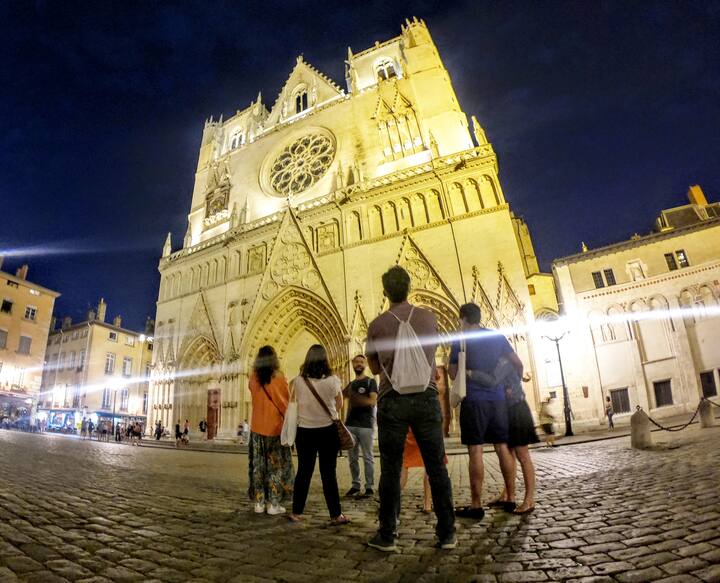유적지
리옹
현지인 242명이 추천하는 곳,
현지인이 제공하는 팁
Les berges du Rhone. Nice walk all along the Rhone with the parc de la Tête d'Or on one side and Parc de Gerland on the other side. By foot or bicycle.
Lyon or Lyons (UK /liːˈɒn/ or /ˈliːɒn/;[3] French pronunciation: [ljɔ̃] ( listen), locally: [lijɔ̃]; Arpitan: Liyon [ʎjɔ̃]) is a city in east-central France, in the Auvergne-Rhône-Alpes region, situated between Paris and Marseille. The correct spelling in French is Lyon, but the spelling Lyons is sometimes specified in English, particularly in newspaper style guides.[4] Lyon is located about 470 km (292 mi) from Paris, 320 km (199 mi) from Marseille, 420 km (261 mi) from Strasbourg, 160 km (99 mi) from Geneva, and 280 km (174 mi) from Turin. The residents of the city are called Lyonnais. The municipality (commune) of Lyon has a population of 500,715 (2013)[1] and is France's third-largest city after Paris and Marseille. Lyon is the seat of the metropolis of Lyon, and the capital of both the department of Rhône and the region of Auvergne-Rhône-Alpes. The greater metropolitan area of Lyon, a concept for statistical purposes that is not an administrative division, has a population of 2,214,068 (2012), which makes it the second-largest metropolitan area in France after Paris.[2] The city is known for its historical and architectural landmarks and is a UNESCO World Heritage Site. Lyon was historically known as an important area for the production and weaving of silk. Since the late 20th century, it has developed a reputation as a major center of French cuisine and an internationally significant gastronomical locale. It has a significant role in the history of cinema due to Auguste and Louis Lumière, who invented the cinematographe in Lyon. The city is also known for its famous light festival, Fête des Lumières, which occurs every 8 December and lasts for four days, earning Lyon the title of Capital of Lights. Economically, Lyon is a major centre for banking, as well as for the chemical, pharmaceutical, and biotech industries. The city contains a significant software industry with a particular focus on video games, and in recent years has fostered a growing local start-up sector.[5] Lyon hosts the international headquarters of Interpol, Euronews, and International Agency for Research on Cancer. Lyon was ranked 19th globally and second in France for innovation in 2011.[6] It ranked second in France and 39th globally in Mercer's 2015 liveability rankings. According to the historian Dio Cassius, in 43 BC, the Roman Senate ordered Munatius Plancus and Lepidus, lieutenants of the assassinated Julius Caesar and governors of central and Transalpine Gaul, respectively, to found a city for a group of Roman refugees. These refugees had been expelled from Vienne (a town about 30 km [19 mi] to the south) by the Allobroges and were now encamped at the confluence of the Saône and Rhône rivers. Dio Cassius says this task was to keep the two men from joining Mark Antony and bringing their armies into the developing conflict. The Roman foundation was at Fourvière hill and was officially called Colonia Copia Felix Munatia, a name invoking prosperity and the blessing of the gods. The city became increasingly referred to as Lugdunum (and occasionally Lugudunum[7]).[8] The earliest translation of this Gaulish place-name as "Desired Mountain" is offered by the 9th-century Endlicher Glossary.[9] In contrast, some modern scholars have proposed a Gaulish hill-fort named Lug[o]dunon, after the Celtic god Lugus ('Light', cognate with Old Irish Lugh, Modern Irish Lú), and dúnon (hill-fort). Marcus Vipsanius Agrippa recognized that Lugdunum's position on the natural highway from northern to south-eastern France made it a natural communications hub, and he made Lyon the starting point of the principal Roman roads throughout Gaul. It then became the capital of Gaul, partly due to its convenient location at the convergence of two navigable rivers, and quickly became the main city of Gaul. Two emperors were born in this city: Claudius, whose speech is preserved in the Lyon Tablet in which he justifies the nomination of Gallic senators, and Caracalla. Today, the archbishop of Lyon is still referred to as "Primat des Gaules" and the city often referred to as the "capitale des Gaules".[citation needed] The Christians in Lyon were martyred for their beliefs under the reigns of various Roman emperors, most notably Marcus Aurelius and Septimus Severus. Local saints from this period include Blandina (Blandine), Pothinus (Pothin), and Epipodius (Épipode), among others. In the second century AD, the great Christian bishop of Lyon was the Easterner Irenaeus.[citation needed] Place Carnot, Lyon Burgundian refugees fleeing the destruction of Worms by the Huns in 437 were resettled by the military commander of the west, Aëtius, at Lugdunum. This became the capital of the new Burgundian kingdom in 461. In 843, by the Treaty of Verdun, Lyon, with the country beyond the Saône, went to Lothair I. It later was made part of the Kingdom of Arles. Lyon did not come under French control until the 14th century. Fernand Braudel remarked, "Historians
Lyon or Lyons (UK /liːˈɒn/ or /ˈliːɒn/;[3] French pronunciation: [ljɔ̃] ( listen), locally: [lijɔ̃]; Arpitan: Liyon [ʎjɔ̃]) is a city in east-central France, in the Auvergne-Rhône-Alpes region, situated between Paris and Marseille. The correct spelling in French is Lyon, but the spelling Lyons is so…
에어비앤비 체험으로 만나는 Lyon
현지인이 진행하는 소규모 그룹 액티비티인 에어비앤비 체험을 통해 이 명소의 매력을 만나보세요.
위치
Lyon, Auvergne-Rhône-Alpes







